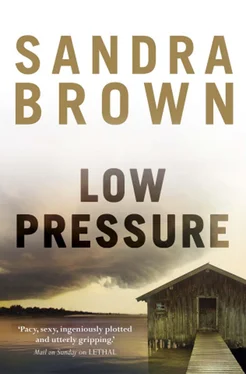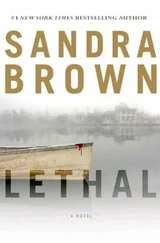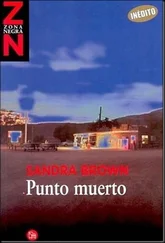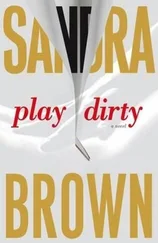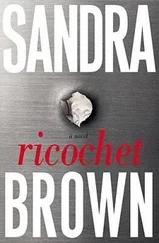“Gall said that?”
She laughed softly and turned to face him. “I supplied the word, but that’s how he described you.” She placed her arm around his waist and rested her cheek against the fuzziness on his chest. “Describe to me how you felt that day.”
While collecting his thoughts, his fingers sifted through her hair. “For as far back as I could remember, I’d been trying to figure out why my dad didn’t like me and what I could do to win him over. That day, when Gall took me up, it was like… like I left all that on the ground.
“During that five-minute flight, it stopped mattering to me whether my dad liked me or not. His indifference couldn’t reach me in the sky. I knew I’d found something more important to my life than he would ever be because I loved it more. I’d found a new home.”
He gave a light laugh. “Of course when we landed, nothing that poetic-sounding came to my adolescent mind. I’ve had years to think about that first flight and how significant it was. Even then, I knew it was life-changing, but, of course, nothing changed immediately.
“We landed, and I went back to that cold house and that unfeeling man. I remained angry and resentful, carried a chip on my shoulder just as I always had. The difference was, I now had something to look forward to. My dad couldn’t lock me out anymore because I’d stopped wanting in.”
He paused as though considering whether or not to continue. “This is going to sound as corny as hell. But”—again, he hesitated—“but during that flight, there was a span of time, maybe forty-five seconds, when the sun shone through a crack in the clouds. And I mean a slit. You know how it sometimes does just before sundown and there are clouds on the horizon?
“Anyway, we were flying at the perfect altitude to be level with it. That beam of sunlight was aimed directly at me. I was staring straight into it and I owned it. It was like a sign or something. For a kid who didn’t have a mother, and a dad who looked through him, that was… Well, it was a lot.
“And I thought to myself, ‘This is what it’s about. It’s never going to get better than this. This is my life’s perfect moment. If I live to be a hundred years old, I’ll remember this till the day I die.’”
Bellamy didn’t move for the longest time. Eventually Dent mumbled, “Told you it was corny.”
“No, it’s lovely.”
“You ever had a moment like that? Do you understand what I’m talking about?”
She raised her head, and a tear slid over her lower eyelid as she smiled down into his face and said softly, “As of right now, I do.”
They slept for several hours and woke to make love again as they showered together. He was assembling the coffee-maker when she emerged from the bathroom, wearing only the dress shirt he’d discarded the night before, towel-drying her hair.
When he turned and saw her, an odd expression came over his face. “What?” she asked.
He shook his head slightly, then gave her a wolfish grin. “I was just thinking how good it looks on you.”
“Your shirt?”
“Debauchery.”
She blushed to the roots of her hair.
“Damn, that gets to me every time.”
“What?”
“Your blush.”
“I don’t blush.”
“Bet you will.”
“ Will? ”
He sat down in one of the chairs at the table, caught her hand, and pulled her into his lap. It was a while before they got around to having their coffee.
Over steaming cups, she told him what she’d learned about the man they knew as Jerry. Dent muttered a few choice phrases. “Steven’s the one I should have gone after.”
“He retained the man to look out for me. He meant well.”
He looked prepared to comment on that, but chose not to. “What was on Moody’s mind?”
She related their conversation and, when she finished, she said, “Admit it, Dent. You must be a little relieved.”
“To know that you didn’t kill her?” When she solemnly nodded, he said, “I’m relieved for your sake. From a practical standpoint, I never really thought you had.”
“But you had considered the possibility.”
“Let’s just say I hoped that when you regained your memory, it wouldn’t be of you choking Susan. I’m glad you don’t have to be haunted by that.”
“Yes. But if it wasn’t me, and it wasn’t Strickland, then who? Moody claims only to know who didn’t. Not who did. We need to—”
“Go see Haymaker,” he said.
The retired detective looked as elfin as ever. “Sorry about your dad,” he said to Bellamy.
She acknowledged the condolence but didn’t linger on it. “Moody said you’d be expecting us.”
He moved aside and motioned them in. They sat as before, he in the recliner, them competing with the dog for space on the sofa. Haymaker pointed down to the case file lying on the coffee table. “Recognize that?”
She nodded.
“Frankly, I can’t believe Dale is ready to share this.” He held up his hands and gave an elaborate shrug. “But who’s to say how a man’s conscience works?”
“He told me that he left some kind of confession with you.”
The former cop took several folded sheets of paper from the pocket of his shirt and spread them open. “Signed.”
“And thumbprinted,” she said, checking the last sheet, where Moody’s signature was affixed along with the thumbprint.
“So what does he confess to, exactly?” Dent asked.
Haymaker settled more comfortably into his chair. “Ever hear of a Brady cop?”
Bellamy and Dent shook their heads.
“There was a Supreme Court case, midsixties, I think. Stemmed from a murder trial, Brady versus Maryland . The court ruled in Brady’s favor. The upshot of it was that police officers and prosecutors had a duty, an obligation, to tell a defendant’s attorney about any exculpatory material or information, even if they think it’s hogwash.
“Even if they’re damn near certain a witness is lying through his teeth on behalf of an offender, they’re still required to share with the other side what they’ve been told. If an investigator discovers something on his own that favors the suspect, he’s still obligated to share it.”
“Which allows for lots of wiggle room,” Dent said.
“And we—meaning cops—wiggle. But those who flat-out lie or deliberately withhold something are cheating the justice system and the law of the land. They’re called Brady cops.”
Bellamy said, “That’s what Moody did?”
“With Jim Postlewhite. Moody questioned him early on, as he did all the men at the barbecue.” Leaning forward, Haymaker reached into the file and removed the sheet of paper bearing Postlewhite’s name underlined in red.
He slipped on a pair of reading glasses. “Mr. Postlewhite told Moody where he was and what he was doing immediately before and after the tornado tore through the park. He described it in some detail. He told Moody about pushing some kids into a culvert before taking cover himself.
“If you can read Moody’s chicken scratching, it’s all written down here.” He removed his glasses and looked at them. “Postlewhite’s story eliminated Allen Strickland as a suspect.”
“Why’s that?”
“Because Allen had helped him shepherd those kids into the culvert.”
“Where was this culvert?” Bellamy asked.
“A long way from where your sister’s body was found. And Postlewhite said that Allen came running over to him and the kids from the parking lot, where he’d been looking for his brother.”
Dent said, “He couldn’t have been two places at once.”
Haymaker nodded. “You had an alibi Dale and Rupe couldn’t shake, so Rupe said they’d nail Allen Strickland instead. But Dale reminded Rupe that Postlewhite could testify that Strickland was somewhere else while the murder was taking place. Rupe told Dale to do whatever was necessary to get Postlewhite to forget that.”
Читать дальше
